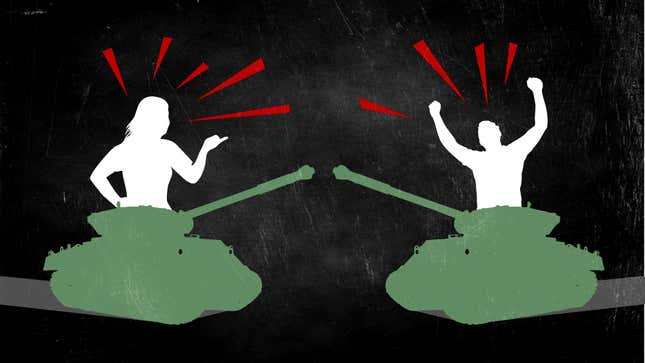In Defense of Being a Lover AND a Fighter
Latest

Conflict is bad. If you’re fighting, something is wrong. Happy people never
fight. Fights are OK but only rarely. Right? You’ve heard all this in the
popular cultcha. And so it was with great excitement that I read about the
couple who broadcasts all their fights on Twitter, because yes and finally!
People who aren’t afraid to be honest (and funny) about their fights. We should all be so transparent about it.
Claire Meyer and Alan Linic have being going out less than a
year and have a Twitter account called We Fought About. And as you may
have read in numerous outlets chronicling the hilarity, they tweet one-liners
about their fight triggers. Some of them are more absurd:
While others are the stuff of everyday fights all the time
everywhere between everyone to infinity forever dot com.
Over at The Cut,
Maggie Lange reports
that the couple, who are in their twenties, live in Chicago, and are in the
comedy scene there, wait until the fight is over to write it up for maximum
objectivity/hilarity, and also are relieved to hear that their fights are
relatable.
“We thought our fights were
just ridiculous and way too bizarre and that’s why we started it,” Meyer
said. Instead, “We kept hearing the same feedback of, ‘This is
exactly what we go through.’ … It actually has made me feel like more of a sane
girlfriend.”
This illustrates precisely why I think the fight chronicling is not gross or
annoying or precious or hipster or dumb, it’s totally brilliant. If we all
talked openly about our fights, if we were more comfortable with conflict and its
resolution, if we didn’t run every relationship through the fairy-tale-o-meter
of zero conflict = happiness, then we might all be totally fine with fighting.
We might accept it as normal. We might see that it’s actually even — gasp — useful. And funny. Especially funny. Because anyone who has ever had a fight
knows it is often both the single most important thing in the universe while
simultaneously the dumbest thing in the universe.
What is a fight anyway? A disagreement, sure, but predicated
on what? Miscommunication typically. Unrealistic expectations. Actions by the
other person that are perceived as selfish or thoughtless or simply not in line
with whatever one person in a relationship thinks are the perceived agreed-upon
values, stated or otherwise, of the relationship.
And a big part of all this confusion is usually this weird concept of unspoken agreements. Can I just say right here and now that the concept of unspoken agreements is super baffling? The thing where someone does something and you’re supposed to know it means X or Y whether they say so or not and return the thing to them you didn’t know they did in the first place because it’s all supposed to be understood?
I bet more relationships have
ended by failure to mind-read than almost any other crime of the heart.
So it goes without saying that lots of fights could be avoided by talking more, by
improving communication, stating/negotiations and expectations, and by lowering expectations. But we are mere mortals over here, not Deepak Chopra. Fights are happening. Deal with it.